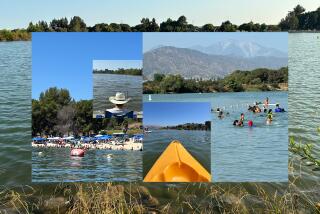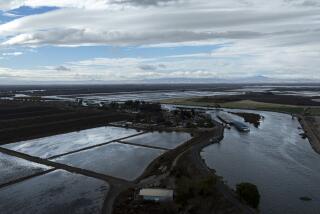Smaller Expansion Plan OKd for Theme Park
- Share via
The county Board of Supervisors on Tuesday unanimously approved a compromise expansion plan for the Raging Waters theme park that it says will protect the habitat of the endangered coastal California gnatcatcher and curb development within county parkland.
Under the terms of the compromise, 75% of the Frank G. Bonelli Regional County Park will remain free of any construction to protect the bird’s habitat.
As a result, Raging Waters--which lies completely within the park’s boundaries--will have to dramatically cut back on new parking areas it wanted to build, as well as build a tram to take visitors into the park.
The compromise marks the end of more than 10 years of negotiating and squabbling among county officials, representatives of several smaller cities, Raging Waters, and local activists over how to balance environmental concerns with development at the park near the south leg of the Foothill Freeway in the San Gabriel Valley.
Although all other parties hailed the plan, Raging Waters officials said that they object to it because it cuts back too much on their proposed expansion of parking and commercial development.
“We naturally do not agree with the compromise plan nor do we like the compromise plan, but that is the plan that has been passed,” Raging Waters general manager Kent Lemasters said after the vote. “Therefore, we will go on and follow what we are allowed to do within that plan.”
Supervisor Mike Antonovich, who represents the district that includes the water park, called the compromise measure “a typical agreement wherein no one got everything he or she sought but everyone did get something.”
Denis Bertone, mayor pro tem of San Dimas and chairman of the Coalition to Preserve Bonelli Park, said the plan approved by the supervisors is “a good deal for everyone. Everyone is gaining from this.”
Bertone said the compromise allows the county to continue to generate revenue by leasing parkland to Raging Waters, addresses the environmental concerns of the coalition and the federal government, and meets the needs of San Dimas in protecting its residents from undue noise and traffic.
The compromise also establishes a project review committee that gives San Dimas and La Verne a say in how Raging Waters operates the park.
County officials also hope that the development curbs will protect the natural ecosystem of oak trees, coastal sage scrub, wetlands and wildlife resources in general and mitigate objections to the proposal raised by the U.S. Fish and Wildlife Service.
More to Read
Sign up for Essential California
The most important California stories and recommendations in your inbox every morning.
You may occasionally receive promotional content from the Los Angeles Times.












